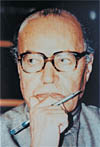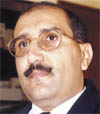Abdu Ali Abdulrahman Interview: “Yemen has pledged its full support for the proposed treaty to ban anti-personnel land-mines.”[Archives:1997/39/Interview]
International efforts are now being channeled to impose a worldwide ban on anti-personnel land-mines. These hidden sources of death continue to take their toll on the lives of innocent civilians long after the military conflict has ended. Of the 66,000 land-mines planted and left behind by the secessionist forces in Yemen in 1994, the majority are still underground, waiting to claim more innocent victims. The Yemeni government has given this matter its priority, but its resources uncovered only a third of the mines. Most of the affected regions are around Aden, in addition to isolated spots in Lahaj, Abyan and Hadhramaut. There are no maps or even clues to were these mines are planted. A full-scale sweep effort is needed to cover about 25,000 sq. km. Technical assistance is currently being provided by the Americans. It is hoped that their efforts will clean up 99% of the mines. The Swedish Child Care organization is also busy trying to raise public awareness of this issue.
Bin Sallam of Yemen Times discussed the crucial issue of land-mines with Mr. Abdu Ali Abdulrahman the Vice Minister of Foreign Affairs. Excerpts:
Q: Could you tell us about the Oslo conference which you have attended recently? A: The aim of the conference was to prepare an international treaty to ban the use, stocking, and manufacture of anti-personnel land-mines. The treaty will also call for the destruction of existing land-mines. Yemen had previously participated in similar conferences including the first one held in Ottawa, Canada and the one later held in Brussels which issued a declaration of intentions to prepare a treaty banning land-mines. Of the 123 countries officially represented at the conference, 92 were actual participants and 31 had the status of observers. Also present were 9 NGOs form various countries.
Q: What has brought this issue to the forefront of world attention? A: It has become quite clear for all countries of the world that anti-personnel land-mines can no longer be considered a military weapon in the exact meaning of the word. These mines have become a major source of killing or maiming hundreds of innocent civilians in different parts of the world, especially in Third World countries. So most of the world has realized the extreme importance of completely banning these mines. However, some countries claim that they still need to use land-mines; therefore, the treaty is going through a difficult phase. Discussions in Oslo continued from 1st to 19th September where different opinions came to the surface. The majority opinion is in favor of concluding, and fully implementing such a treaty. Few countries, however, are trying to gain time, especially in extending the period allowed for destroying land-mines. The great powers, for instance, want a 9-year period for demining and destroying the stocked land-mines. The majority of other countries believe that 3 years are quite enough for this purpose. In the end, the treaty reached a compromise of 4 years.
Q: How was the general position towards the outcome of the conference? A: There is a unanimous agreement by all participants that such a treaty should be concluded. The NGOs at the conference were strongly lobbying for its endorsement. For this purpose, demonstrations were organized in Oslo and pamphlets were distributed by Norwegian and other world activists. They called for adopting the treaty without any exceptions or exemptions.
Q: What is Yemen’s position in this regard? A: Yemen has supported the Brussels declaration and participated with other Third World and Western countries in adopting the draft treaty without making exceptions for any country. The Yemeni delegation to the Oslo conference consisted of legal, diplomatic, and military specialists who coordinated their efforts with other delegations for the purpose of endorsing the treaty. So our country is now fully ready for the signing of the treaty next December in Ottawa, Canada.
Q: How will Yemen benefit from such a treaty? A: Yemen has positively interacted with this issue by its commitment to bear full responsibility towards the international community. Our country has its share of harm and damage caused by land-mines randomly planted during the war for unity in 1994. So we are fully committed to seeing a ban imposed on anti-personnel land-mines. In recognition of Yemen’s positive approach, the international community has pledged its financial and technical support to help rid the country of this menace. The Swedish Child Care organization has taken the initiative by planning a special seminar on land-mines to be held in Sana’a next November. A number of countries and NGOs will take part.
Q: Do you have an estimate of the number of mines planted in Yemen? A: There are military reports on the numbers and places of land-mines in Yemen. All this information, however, is approximate. Work is underway to prepare more accurate reports to be presented at the upcoming seminar.
Q: Will Yemen get rid of its inventory of land-mines? A: After the signing of the proposed treaty, Yemen will fully implement its provisions regarding the destruction of stocked land-mines. Unfortunately, I do not have any estimates of how large is the number of mines stored in our country. As soon as the treaty is ratified, Yemen will start to get rid of its land-mines.
Q: Has Yemen taken any steps to demine its affected areas? A: Yemen has made a lot of effort to remove these mines. Much progress had been made, but there is still a lot to be done. Delays in mine-sweeping efforts are experienced due to the haphazard nature of planting them. Modern technology and a lot of time and effort are needed to safely discover and remove these mines. International financial and technical assistance are badly needed to shore up the government’s efforts in this field.
Q: Let’s now talk about the 35th anniversary of the September revolution. Has this revolution been able to achieve its goals as drawn by its leaders? A: The revolution has strategic objectives, the implementation of which will require a long time. I believe that Yemen, since the outbreak of the revolution and despite all the conspiracies, has been able to achieve a lot – politically, economically and socially. A simple comparison between conditions before and after the revolution can prove my point. These achievements, however, are still below what we aspire for. But I can confidently say that a lot has already been done. The unification of the country and the great development process are two bright examples. Yemen now has a more prominent status and a bigger role to play, regionally and internationally. We now have a strong army to defend the revolution and its achievements. Democratization in itself represents a great leap forward. A few years ago, many of these accomplishments were mere dreams.
Q: What has the Ministry of Foreign Affairs done regarding the foreign media campaign depicting Yemen as an unsafe country for tourists? A: The Ministry of Foreign Affairs is very concerned about this matter. Our embassies are closely following and responding to what is being reported by the foreign media. We try our best to clarify matters with Western countries. The kidnapping of foreign tourists is an attempt by suspicious groups to distort Yemen’s international image, disrupt the process of democratization, and shake the country’s unity.
Q: Are there any foreign or external forces behind these kidnappings? A: These events cannot be dissociated from external conspiracies to disrupt Yemen’s stability and security. Some people in the government have often declared that there are foreign powers behind the kidnapping of tourists in Yemen. Some people were arrested, and confessed to being connected to hostile groups outside Yemen.
Q: How much has the Ministry of Foreign Affairs achieved in its restructuring program? A: Within the program of economic and administrative reform being implemented in Yemen, our ministry has submitted its own proposals for reform which were endorsed by parliament two years ago. Satisfactory progress has been made in this respect, both in Yemen and in our missions abroad. Much re-structuring has been done in the ministry’s local organs. Highly qualified and experienced staff have recently been appointed in leading positions, locally and abroad.
——
[archive-e:39-v:1997-y:1997-d:1997-09-29-p:./1997/iss39/intrview.htm]


